Detained and interrogated for 10 hours in North Korea
- Published
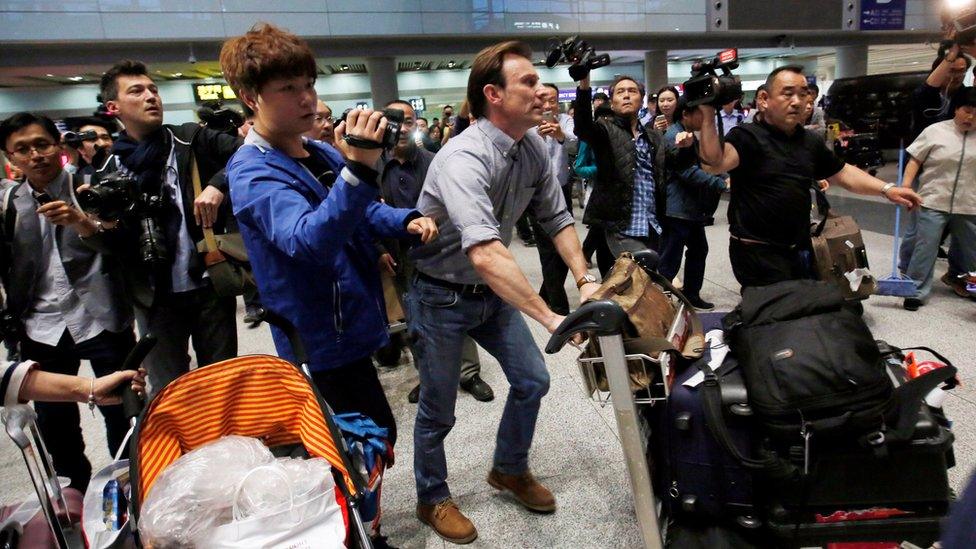
The BBC's Rupert Wingfield-Hayes was last week expelled from North Korea and forced to apologise for his reporting. He was held incommunicado for 10 hours and interrogated. Here he gives his first account of what happened.
After a week in North Korea I was more than ready to go home. The trip, to cover a visit to Pyongyang by a delegation of three Nobel laureates, had been exhausting and stressful.
I couldn't move anywhere in Pyongyang without a team of five minders following my every step. At night the BBC team was confined to an overheated villa in a guarded compound. We'd fallen out with pretty much everyone. Our North Korean minders were now openly hostile.
We were all looking forward to a cold beer and a good night's sleep in Beijing.
For some reason the female immigration officer at Pyongyang airport was taking a very long time with my passport. By the time she finally stamped it everyone else had cleared security and gone to the gate. It felt odd, but I wasn't immediately alarmed.
Then a North Korean border guard called me over - in his hand, my digital recorder.
"We need to check this," he said pointing down a corridor.
In a back room another border guard was trying to open the files from my recorder on a laptop computer.
"What is the problem?" I asked. "There's nothing on that card."
"Just wait," he responded.
"I can't wait," I said. "I have to get on my flight to Beijing."
"The flight is already gone," the border guard said looking straight at me. "You will not be going to Beijing."
Now my sense of alarm was rising fast.
"My God," I thought. "This is real. My flight is leaving and I am being left behind in North Korea!"
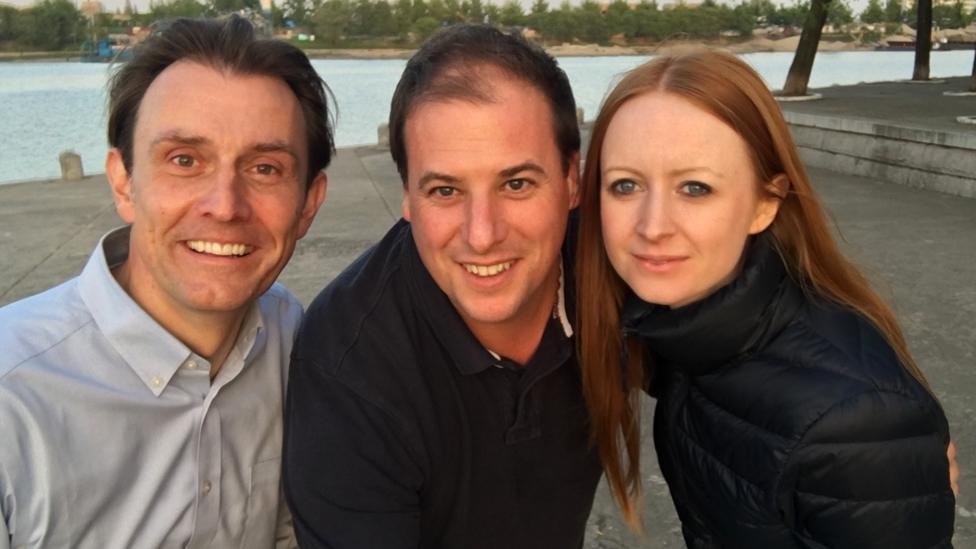
Rupert Wingfield-Hayes, Matthew Goddard and Maria Byrne in North Korea
Actually I wasn't. At that moment my colleagues Maria Byrne and Matthew Goddard were refusing to board the plane, shouting at the North Korean guards who were trying to push them on board.
But I knew none of this. I felt very alone.
Two of our old minders now appeared at the door.
"We are taking you to meet with the relevant organs," they proclaimed. "All will become clear."
I was marched to a waiting car and put in the back, a minder on either side.
As we drove through the almost empty streets of Pyongyang no-one spoke. Looking at the drab concrete apartment blocks, I contemplated my situation. Even in North Korea you don't detain a visiting journalist unless it has been approved from high up. I thought about American college student Otto Warmbier, sentenced to 15 years' hard labour for stealing a propaganda banner from his Pyongyang hotel. Would I be the next to be paraded on state TV?
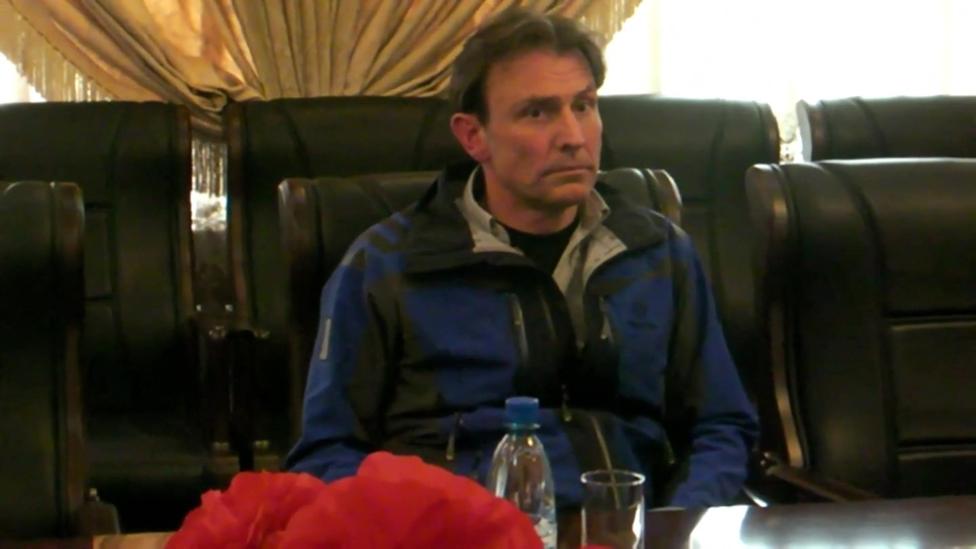
Rupert Wingfield-Hayes in the interrogation room - image provided by North Korea
The car pulled into the driveway of an old grey hotel. I was taken into a conference room and told to sit. Huge portraits of Kim Il-sung and Kim Jong-il looked down from the far wall.
A group of officials in dark Mao suits walked in and sat opposite. The older one spoke first.
"Mr Rupert," he said, "this meeting can be over quickly and simply, it will depend on your attitude."
I was told that my reporting had insulted the Korean people, and that I needed to admit my mistakes. They produced copies of three articles that had been published on the BBC website, as I reported on the visit of the Nobel laureates.
Part one: North Korea inches open its doors
Part two: The limits of small talk in Pyongyang
Part three: Searching for self-reliance and 'real people'
"Do you think Korean people are ugly?" the older man asked.
"No," I answered.
"Do you think Korean people have voices like dogs?"
"No," I answered again.
"Then why do you write these things?!" he shouted.
I was confused. What could they mean? One of the articles was presented to me, the offending passage circled in black marker pen:
"The grim-faced customs officer is wearing one of those slightly ridiculous oversized military caps that they were so fond of in the Soviet Union. It makes the slightly built North Korean in his baggy uniform comically top heavy. "Open," he grunts, pointing at my mobile phone. I dutifully punch in the passcode. He grabs it back and goes immediately to photos. He scrolls through pictures of my children skiing, Japanese cherry blossom, the Hong Kong skyline. Apparently satisfied he turns to my suitcase. "Books?" he barks. No, no books. "Movies?" No, no movies. I am sent off to another desk where a much less gruff lady is already looking through my laptop."
"Are they serious?" I thought. They had taken "grim-faced" to mean "ugly", and the use of the word "barks" as an indication that I thought they sounded like dogs.
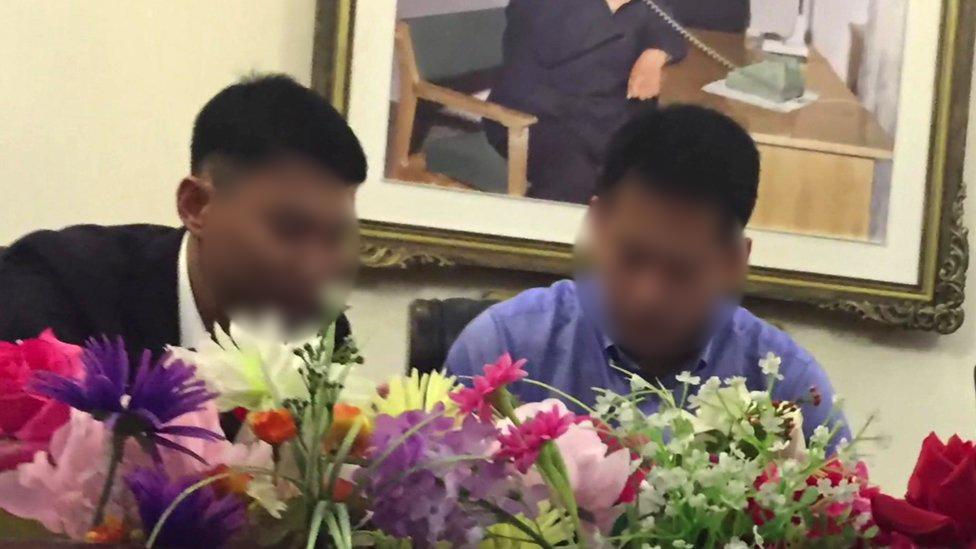
The two men who led the interrogation
"It doesn't mean what you think it means." I protested.
The older man squinted.
"I have studied English literature," he said. "Do you think I do not understand what these expressions mean?
For two hours they demanded I confess my mistakes. Finally the older man got up to leave.
"It is clear that your attitude is going to make this difficult," he said. "We have no choice but to carry out a full investigation."
Now a younger man took charge.
"Do you know who I am?" he asked.
"No," I answered.
"I am from the judicial authorities. I am the one who investigated the case of Kenneth Bae, and now I am going to investigate you.
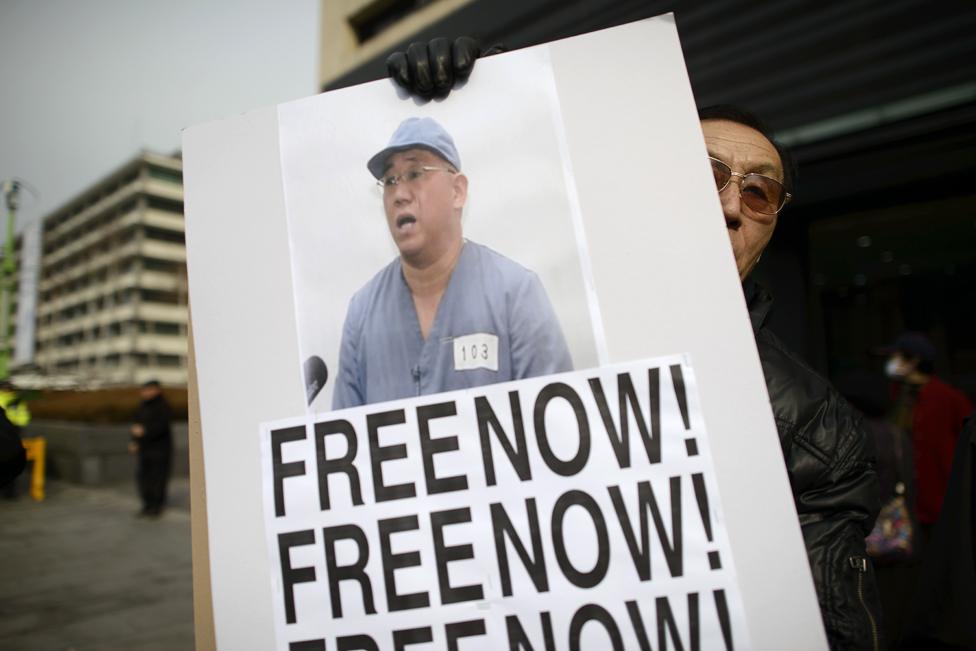
An activist in Seoul holds a placard calling for the release of Kenneth Bae, February 2014
The pit of my stomach turned cold. Kenneth Bae is a Korean American who was sentenced to 15 years' hard labour by Pyongyang in 2013.
They began going through my articles word by word - finding offence in almost every one. But the words were not important; they were ammunition to throw at me, to force me to confess.
"We can sit here all night," I said. "I am signing nothing."
"We have plenty of time," the young man shot back. "This can take a night, a day, a week or a month. The choice is yours."
Hour after hour they repeated the accusations. The pace was relentless. Every two hours they took a break and another team stepped in. They began to use the term "serious crime".
"What crime?" I asked.
"Defamation of the Korean people and nation," the interrogator said.

Rupert Wingfield-Hayes in North Korea
In one of the video reports filed from Pyongyang before he was detained, Rupert Wingfield-Hayes is accused by North Korean authorities of not showing respect for the country's leader.
A rare look inside North Korea's Kim Il-sung University


By now the interrogation had been going for more than five hours. Unknown to me, at another hotel in Pyongyang the alarm was finally being raised.
A second BBC team, led by Asia bureau editor Jo Floto, was in Pyongyang covering the North Korean Workers' Party Congress. They'd been phoned by colleagues in Beijing who told them my team had never made it to China. Jo now started to try to find us. He got his minder to call the foreign ministry, but they had no idea where we were. It took another two hours for the minder to find out where I was being held.
In the interrogation room they now produced a new series of printouts, articles published by South Korean media.
"Have you seen what the South Korean media are saying about your reports?" the young interrogator demanded.
"No," I answered.
"That they show everything the DPRK government says is a lie!!"
He glared at me.
"Did you meet with South Korean media before you came to Pyongyang?" he asked. "Did you collude to orchestrate a campaign of anti-DPRK propaganda?"
I thought: "This is how a show trial is built."
At about 1:30 am I asked to go to the toilet. Each time I went, two minders were sent with me. One stood at the next urinal, the other directly behind me.
This time, as I came out, one of our old minders, Mr Oh, emerged from another room.
"I think your boss is coming here now," he said.
I didn't know whether to believe him, but Jo was on his way. I found out later that as he arrived at the hotel, his foreign ministry minder had turned and said: "Mr Floto, please remember that we have no control over the people we are about to meet."
An hour later, Jo was brought into the room where I was being held. I felt a wave of relief, but he looked worried. He still had no idea where they had taken Maria and Matthew. Nothing had been heard from them. Then he pointed at the young interrogator.
"He does not seem to care about the damage detaining you will do to North Korea's image," he said. "He seems quite prepared to put you on trial."
We needed to get this over quickly, and to do so I needed to make an act of contrition.
We agreed that I would write a short letter "apologising for the offence my articles had caused". We agreed it would be a written statement and would not be published.
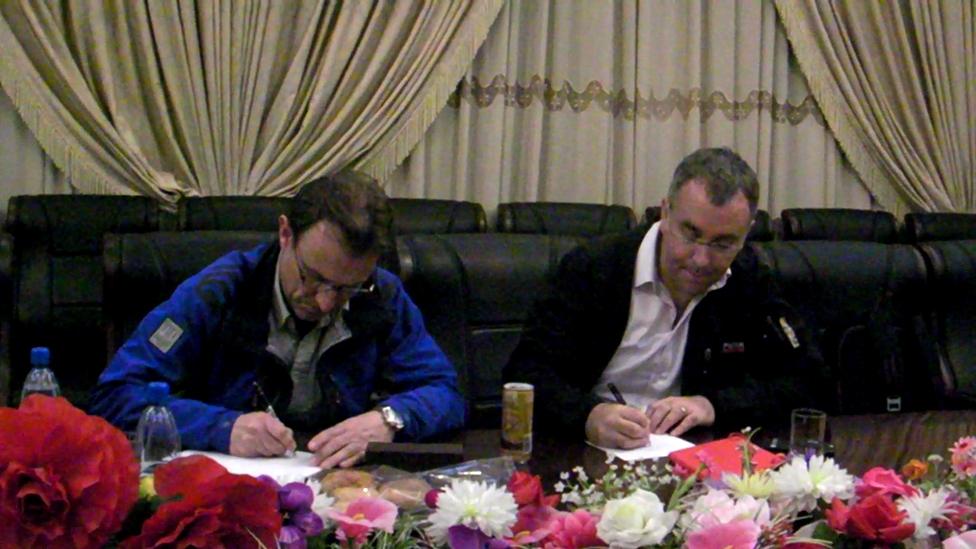
This image of of Rupert Wingfield-Hayes and Jo Floto was provided by North Korea

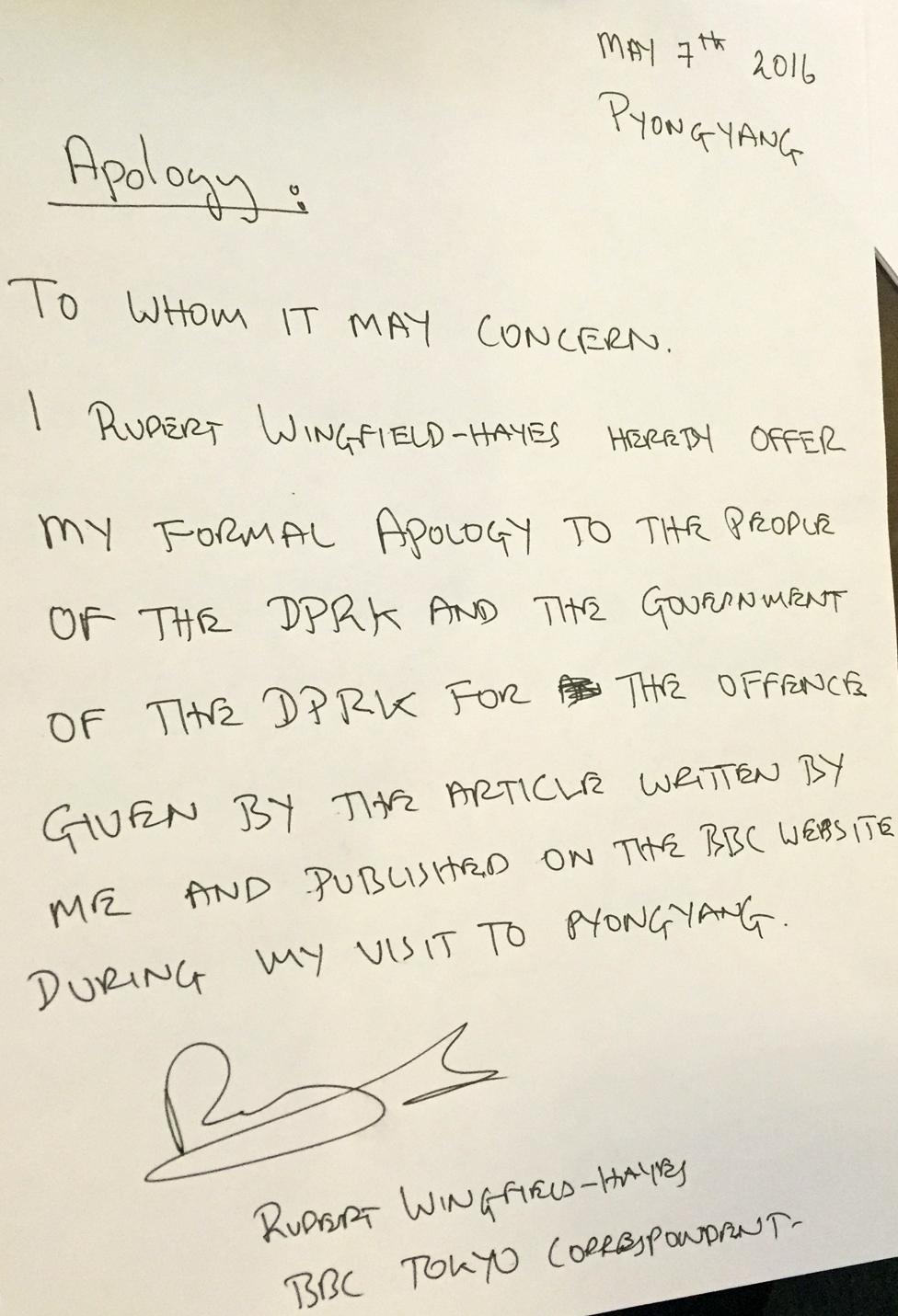

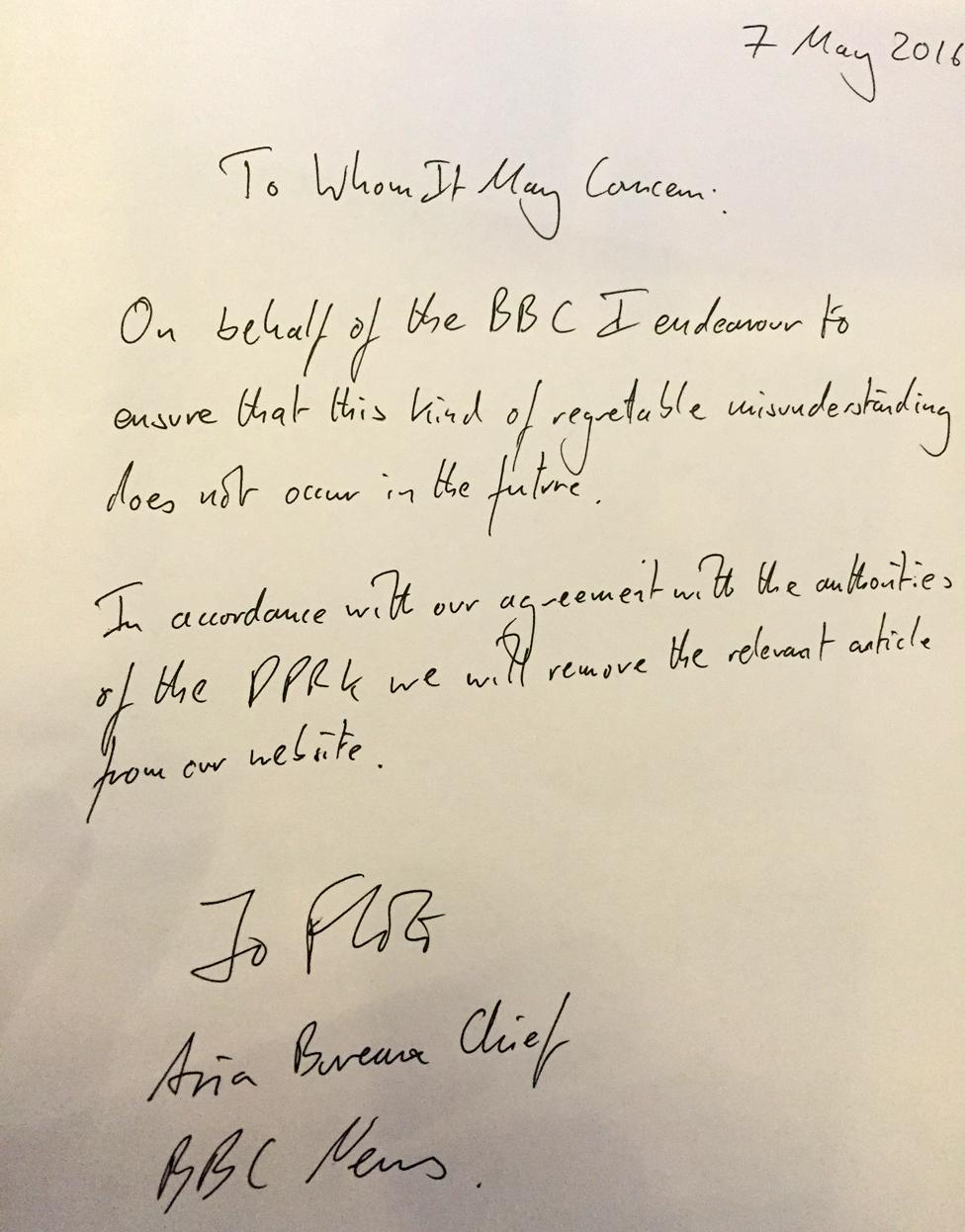
But within minutes the interrogator went back on his word.
"To show your sincerity stand up and read it out loud," he said handing me the sheet of paper.
In the corner a man with a video camera was filming.
I refused.
Finally at 03:30 I was released and we were taken to meet Maria and Matthew. They were being held at another guesthouse in the hills outside Pyongyang. It was now more than 10 hours since I had disappeared at the airport and they were frantic with worry.
The following day we were allowed to move to the Yanggakdo hotel, a huge tower on an island in the Taedong River. All the international media were being housed there, so we felt much safer. But for two more days we were refused permission to leave North Korea.
Rupert Wingfield-Hayes after his interrogation and the announcement that he would be expelled
Then suddenly on Monday 8 May, just as we were preparing to drive to the airport, the government announced I was being expelled.
Why did they choose to detain and expel me? My best guess is that someone high up decided my reporting had endangered the success of the Nobel laureates' visit. Pyongyang yearns for recognition. Their trip was of great importance to the government. The three Nobel laureates were shown the very best of the country. They met its brightest students. Our coverage was a threat to that plan, and an example needed to be made.
Ironically, by doing so they gave me a rare glimpse inside the dark heart of the North Korean state. I spent only 10 hours in detention. But in that time I got to see just how easy it is for someone in North Korea to disappear. I got to feel the terror of being isolated and accused of crimes I had not committed, and to be threatened with a trial in which the evidence would have been irrelevant, and my guilt assured.
Subscribe to the BBC News Magazine's email newsletter to get articles sent to your inbox.